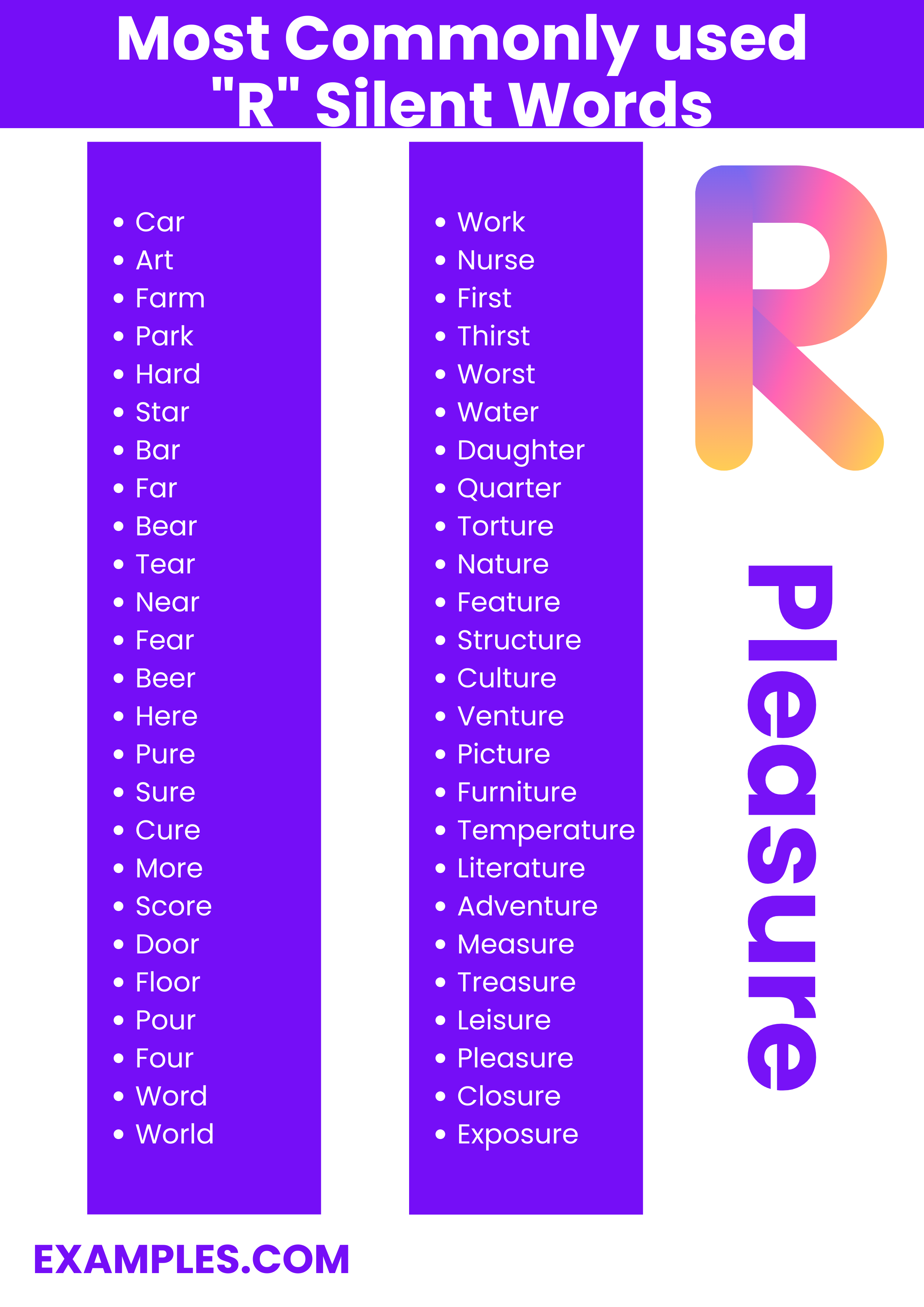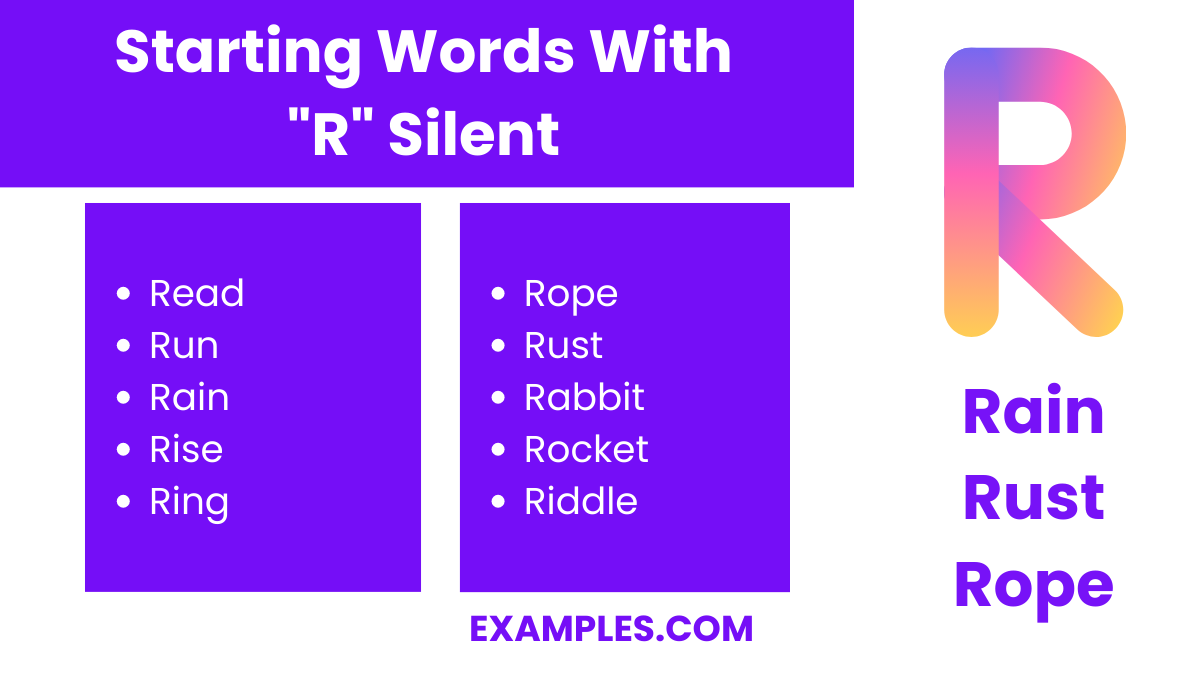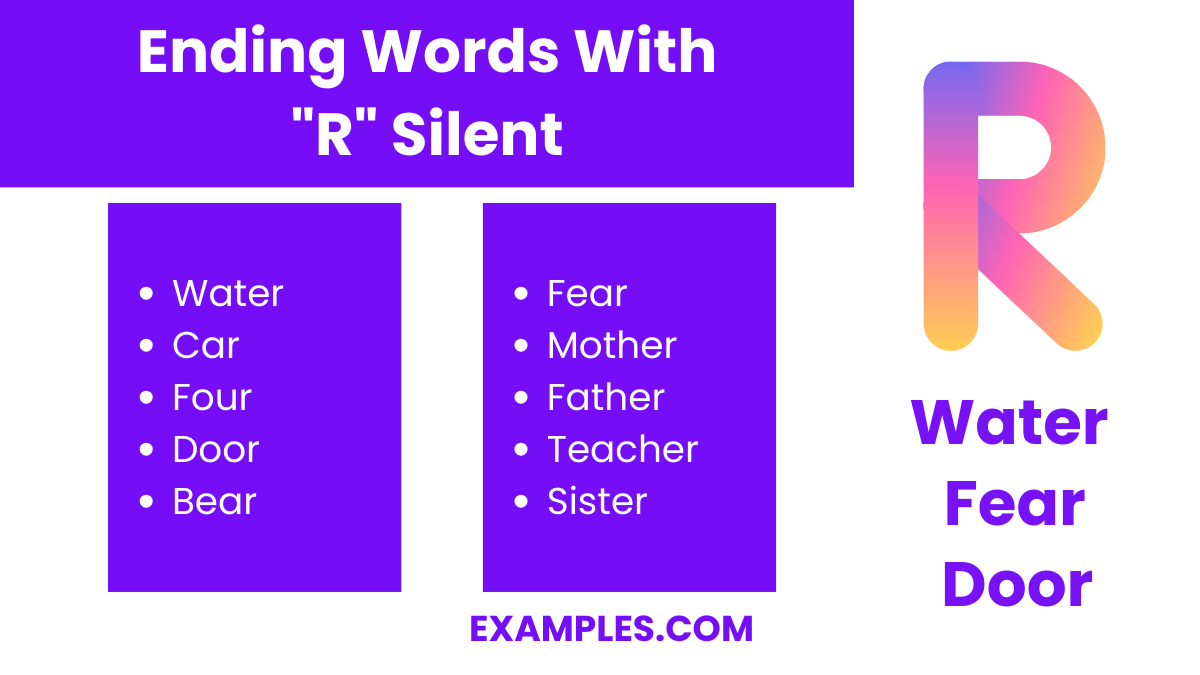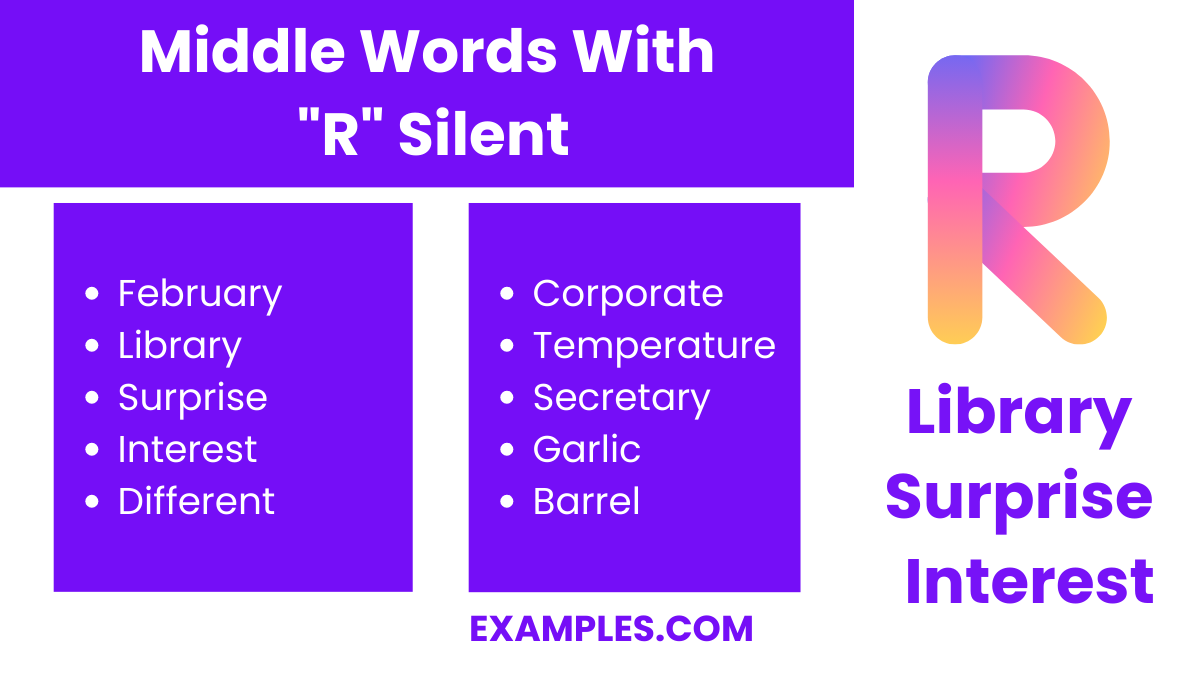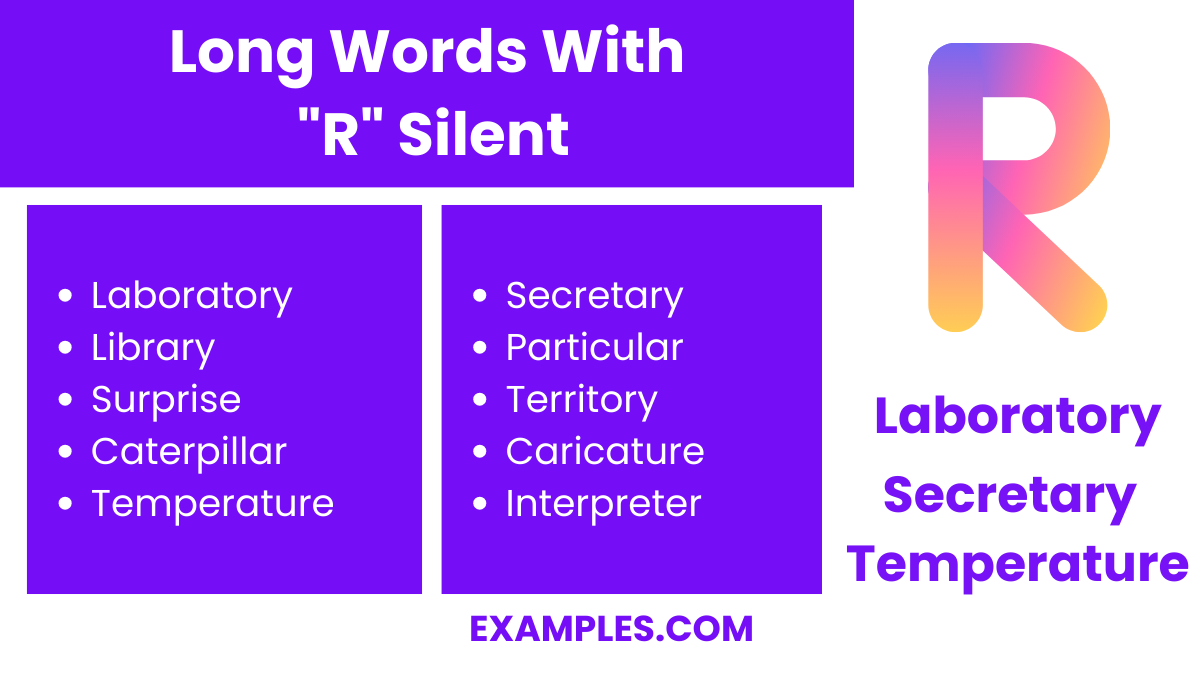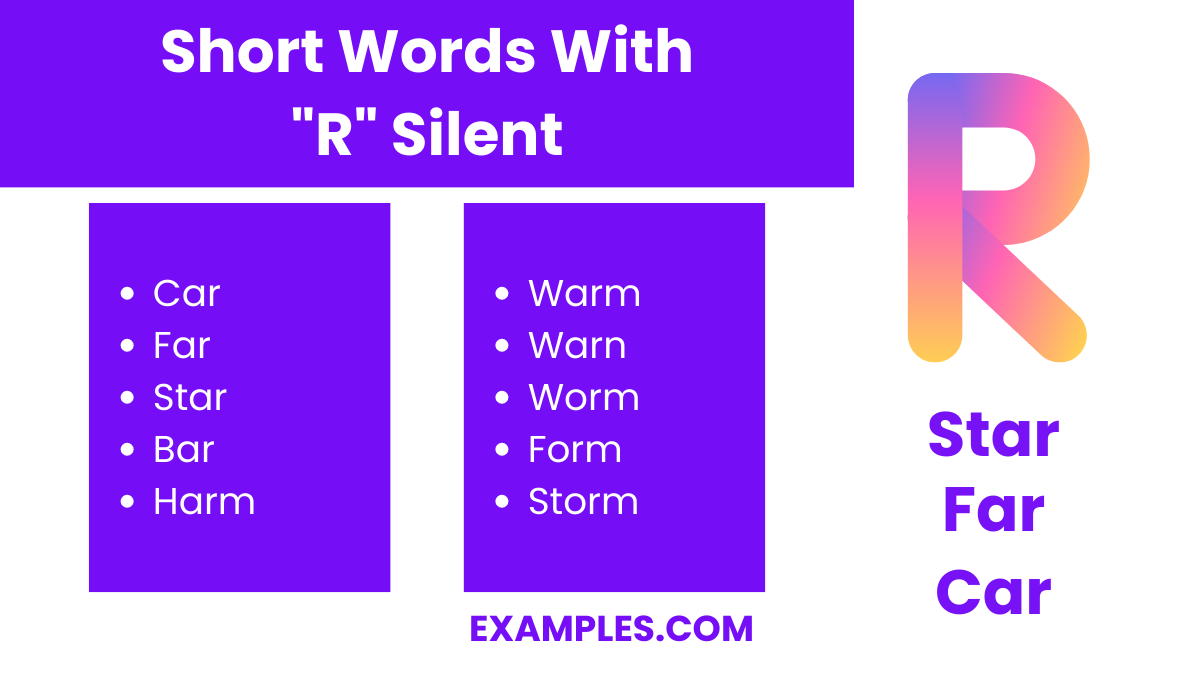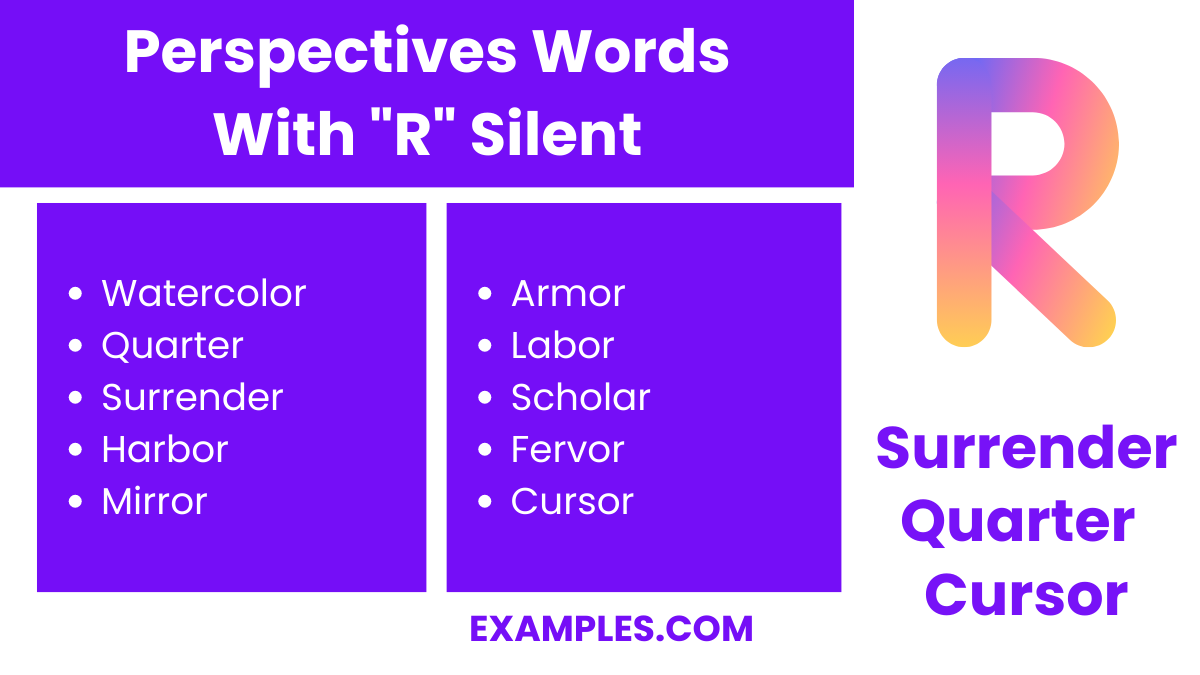450+ R Silent Words List, Meaning, PDF
Embark on a linguistic journey through the intriguing world of silent “R” words in English. This peculiar phonetic phenomenon, where the “R” is present in spelling but remains unvoiced in pronunciation, offers a fascinating glimpse into the complexity and diversity of the language. Perfect for language enthusiasts and learners alike, this exploration sheds light on the subtle nuances that enrich English, challenging our understanding of phonetics and inviting us to delve deeper into its unique characteristics.
Download Most Commonly Used R Silent Words - PDF
50+ Most Commonly used “R” Silent Words
Creating a list of words with a silent “R” in standard English pronunciation isn’t feasible because “R” is typically pronounced in most positions within words. However, in non-rhotic accents, such as those found in parts of England and Australia, the “R” at the end of words or before a consonant is often not pronounced. Here’s an extended list of words that, in non-rhotic dialects, might effectively have a silent “R”:
| Word | Phonetic Transcription (Non-rhotic) |
|---|---|
| Car | /kɑː/ |
| Art | /ɑːt/ |
| Farm | /fɑːm/ |
| Park | /pɑːk/ |
| Hard | /hɑːd/ |
| Star | /stɑː/ |
| Bar | /bɑː/ |
| Far | /fɑː/ |
| Bear | /bɛə/ |
| Tear | /tɛə/ |
| Near | /nɪə/ |
| Fear | /fɪə/ |
| Beer | /bɪə/ |
| Here | /hɪə/ |
| Pure | /pjʊə/ |
| Sure | /ʃʊə/ |
| Cure | /kjʊə/ |
| More | /mɔː/ |
| Score | /skɔː/ |
| Door | /dɔː/ |
| Floor | /flɔː/ |
| Pour | /pɔː/ |
| Four | /fɔː/ |
| Word | /wɜːd/ |
| World | /wɜːld/ |
| Work | /wɜːk/ |
| Nurse | /nɜːs/ |
| First | /fɜːst/ |
| Thirst | /θɜːst/ |
| Worst | /wɜːst/ |
| Water | /ˈwɔːtə/ |
| Daughter | /ˈdɔːtə/ |
| Quarter | /ˈkwɔːtə/ |
| Torture | /ˈtɔːtʃə/ |
| Nature | /ˈneɪtʃə/ |
| Feature | /ˈfiːtʃə/ |
| Structure | /ˈstrʌktʃə/ |
| Culture | /ˈkʌltʃə/ |
| Venture | /ˈventʃə/ |
| Picture | /ˈpɪktʃə/ |
| Furniture | /ˈfɜːnɪtʃə/ |
| Temperature | /ˈtemprətʃə/ |
| Literature | /ˈlɪtrətʃə/ |
| Adventure | /ədˈventʃə/ |
| Measure | /ˈmeʒə/ |
| Treasure | /ˈtreʒə/ |
| Leisure | /ˈleʒə/ |
| Pleasure | /ˈpleʒə/ |
| Closure | /ˈkləʒə/ |
| Exposure | /ɪkˈspəʊʒə/ |
| Pressure | /ˈpreʃə/ |
Starting Words With “R” Silent
In English, the phenomenon of words starting with a silent “R” is virtually non-existent, given the pronounced nature of “R” in various word positions. This characteristic highlights the pronounced clarity of “R” in daily use English words, making the concept of a starting silent “R” more of an intriguing exception than a rule. Exploring the broader concept of silent letters within the English language, however, opens up a unique avenue to delve into its complexities and anomalies. While we might not find examples that perfectly fit the criterion of a starting silent “R”, this exploration itself can be an invaluable educational tool. It emphasizes the diverse and sometimes surprising aspects of English pronunciation and spelling, offering learners insights into the language’s rich phonetic and orthographic landscape.
- Read (/riːd/) – To look at and comprehend the meaning of written or printed matter.
- Run (/rʌn/) – To move at a speed faster than a walk, never having both or all the feet on the ground at the same time.
- Rain (/reɪn/) – Moisture condensed from the atmosphere that falls visibly in separate drops.
- Rise (/raɪz/) – To move from a lower position to a higher one; come or go up.
- Ring (/rɪŋ/) – A small circular band, typically made of precious metal and often set with one or more gemstones, worn on a finger as an ornament or a token.
- Rope (/roʊp/) – A thick, strong cord made by twisting together strands of hemp, sisal, nylon, or similar material.
- Rust (/rʌst/) – A red or orange coating that forms on the surface of iron when exposed to air and moisture.
- Rabbit (/ˈræbɪt/) – A burrowing, gregarious, plant-eating mammal with long ears, long hind legs, and a short tail.
- Rocket (/ˈrɒkɪt/) – A cylindrical projectile that can be propelled to a great height or distance by the combustion of its contents, used typically as a firework or signal.
- Riddle (/ˈrɪdəl/) – A question or statement intentionally phrased so as to require ingenuity in ascertaining its answer or meaning.
Ending Words With “R” Silent
Exploring words with a silent “R” at the end reveals the intriguing diversity of English accents, particularly in non-rhotic accents where the final “R” often goes unpronounced, lending these words a distinctive sound profile. This feature is especially noticeable in sight words, which are fundamental for early language learning and literacy. In educational settings, understanding the variation in pronunciation due to accent differences can enhance phonetic awareness and appreciation for the richness of English dialects, providing learners with a broader perspective on language and its regional nuances. This exploration into the silent “R” in certain accents not only enriches vocabulary but also fosters a deeper understanding of linguistic diversity.
- Water (/ˈwɔː.tə/ in non-rhotic accents) – A clear liquid essential for life.
- Car (/kɑː/ in non-rhotic accents) – A road vehicle with an engine, four wheels, and seats for a small number of people.
- Four (/fɔː/ in non-rhotic accents) – The number after three.
- Door (/dɔː/ in non-rhotic accents) – A movable entrance to a building or room.
- Bear (/bɛə/ in non-rhotic accents) – A large, heavy mammal with thick fur and a very short tail.
- Fear (/fɪə/ in non-rhotic accents) – An unpleasant emotion caused by the threat of danger, pain, or harm.
- Mother (/ˈmʌð.ə/ in non-rhotic accents) – A female parent.
- Father (/ˈfɑː.ðə/ in non-rhotic accents) – A male parent.
- Teacher (/ˈtiː.tʃə/ in non-rhotic accents) – Someone whose job is to teach in a school.
- Sister (/ˈsɪs.tə/ in non-rhotic accents) – A female sibling.
Middle Words With “R” Silent
In the middle of words, the “R” is typically pronounced in most English dialects, serving as a vibrant and resonant phoneme. However, in certain compound words or words with prefixes and suffixes, the “R” might be less emphasized, and in some non-rhotic accents, it may be barely pronounced, giving these describing words a unique phonetic texture. This nuanced pronunciation can significantly influence the sound and rhythm of speech, particularly in richly descriptive language. Understanding this subtlety enhances linguistic skills, offering learners insight into the diversity of English pronunciation and the intricate ways in which accents and dialects can shape the spoken word. Engaging with these describing words, therefore, not only expands vocabulary but also deepens appreciation for the complexity and variability of English phonetics.
- February (/ˈfɛb.ruː.ə.ri/ in some accents) – The second month of the year.
- Library (/ˈlaɪ.brə.ri/ in some accents) – A building or room containing collections of books.
- Surprise (/səˈpɹaɪz/ in some accents) – An unexpected or astonishing event.
- Interest (/ˈɪn.trəst/ in some accents) – The feeling of wanting to know or learn about something.
- Different (/ˈdɪf.ər.ənt/ in some accents) – Not the same as another or each other.
- Corporate (/ˈkɔː.pə.rət/ in some accents) – Relating to a large company or group.
- Temperature (/ˈtɛm.pə.tʃə/ in some accents) – The degree of internal heat of a person’s body.
- Secretary (/ˈsɛk.rə.tər.i/ in some accents) – A person employed by an individual or in an office to assist with correspondence, make appointments, and carry out administrative tasks.
- Garlic (/ˈɡɑːr.lɪk/) – A strong-smelling pungent-tasting bulb, used as a flavoring in cooking.
- Barrel (/ˈbær.əl/) – A cylindrical container bulging out in the middle, traditionally made of wooden staves.
Long Words With “R” Silent
Exploring long words with a silent “R” offers a fascinating glimpse into the variances of English pronunciation across different dialects, particularly in non-rhotic accents where the “R” following a vowel words might not be pronounced if not followed by another vowel. This phonetic characteristic enriches the tapestry of English, revealing how regional pronunciations can influence the spoken language. The silent “R” in these longer words not only challenges conventional pronunciation rules but also serves as a testament to the language’s adaptability and the diverse linguistic backgrounds of its speakers. Engaging with these words enhances our understanding of English’s global nature and the subtle intricacies that define its pronunciation.
- Laboratory [ləˈbɒr.ə.tri] – A room or building equipped for scientific experiments, research, or teaching, or for the manufacture of drugs or chemicals.
- Library (/ˈlaɪ.bɹə.ɹi/) – A collection of books and other informational materials.
- Surprise (/səˈpɹaɪz/) – An unexpected event or piece of information.
- Caterpillar (/ˈkæt.əˌpɪl.əɹ/) – The larval stage of butterflies and moths.
- Temperature (/ˈtɛm.pəɹ.ə.tjʊəɹ/) – A measure of the warmth or coldness of an environment or object.
- Secretary (/ˈsɛk.ɹə.tɹi/) – An administrative assistant in an office.
- Particular (/pəˈtɪk.jʊ.ləɹ/) – Specific or distinct from others.
- Territory (/ˈtɛɹ.ɪ.tɔː.ɹi/) – An area of land under the jurisdiction of a ruler or state.
- Caricature (/ˈkæɹ.ɪ.kə.tʃʊəɹ/) – A picture, description, or imitation of a person in which certain striking characteristics are exaggerated.
- Interpreter (/ɪnˈtɜː.pɹɪ.təɹ/) – A person who translates spoken words from one language to another.
Short Words With “R” Silent
Exploring short, funny words with a silent “R” presents a playful dive into English phonetics, showcasing the quirks that arise in non-rhotic accents. In these dialects, the “R” following a vowel may go unvoiced if not succeeded by another vowel, adding a humorous twist to the pronunciation of certain words. This linguistic feature not only illuminates the diverse pronunciation patterns across English but also celebrates the language’s capacity for whimsy and variation. Engaging with these amusing words enhances phonetic awareness and fosters an appreciation for the rich tapestry of English dialects, making the study of silent “R”s an entertaining venture for language enthusiasts and learners keen on exploring the lighter side of linguistics.
- Car (/kɑː/) – A road vehicle for transportation.
- Far (/fɑː/) – At, to, or by a great distance.
- Star (/stɑː/) – A fixed luminous point in the night sky.
- Bar (/bɑː/) – A long rod or rigid piece of material.
- Harm (/hɑːm/) – Physical injury or damage.
- Warm (/wɔːm/) – Having a moderately high temperature.
- Warn (/wɔːn/) – To inform someone of a danger or risk.
- Worm (/wɔːm/) – A slender, elongated, soft-bodied invertebrate.
- Form (/fɔːm/) – The visible shape or configuration of something.
- Storm (/stɔːm/) – A violent disturbance of the atmosphere.
Perspectives Words With “R” Silent
Exploring Perspective consonant words with a silent “R” provides a distinctive view into the complexities of English pronunciation, particularly evident in non-rhotic accents where the “R” following a vowel remains unspoken unless it’s followed by another vowel. This phonetic trait enhances conversations around linguistic diversity, highlighting the adaptive nature of English in mirroring the diverse array of its speakers from various regions and cultural backgrounds. Investigating these words not only expands phonetic knowledge but also sparks discussions on how culture and geography shape language. Engaging with consonant words featuring a silent “R” deepens our understanding of the elaborate patterns of English pronunciation, encouraging learners to recognize and value the nuanced perspectives that language encapsulates.
- Watercolor (/ˈwɔː.tə.kʌl.ə/) – A painting method using paints mixed with water.
- Quarter (/ˈkwɔː.tə/) – One-fourth of something.
- Surrender (/səˈrɛn.də/) – To give up or yield to the power of another.
- Harbor (/ˈhɑː.bə/) – A place on the coast where vessels may find shelter.
- Mirror (/ˈmɪr.ə/) – A reflective surface, now typically of glass.
- Armor (/ˈɑː.mə/) – Protective covering made of metal used in combat.
- Labor (/ˈleɪ.bə/) – Work, especially hard physical work.
- Scholar (/ˈskɒl.ə/) – A specialist in a particular branch of study.
- Fervor (/ˈfɜː.və/) – Intense and passionate feeling.
- Cursor (/ˈkɜː.sə/) – A movable indicator on a computer screen.
In conclusion, Exploring words with a silent “R” unveils the fascinating intricacies of English pronunciation, particularly in non-rhotic dialects. This linguistic journey not only enriches vocabulary but also deepens understanding of regional variations, highlighting the language’s diversity. Such insights are invaluable for educators and students alike, fostering a greater appreciation for the subtle complexities within the phonetic landscape of English.
450+ R Silent Words List, Meaning, PDF

Embark on a linguistic journey through the intriguing world of silent “R” words in English. This peculiar phonetic phenomenon, where the “R” is present in spelling but remains unvoiced in pronunciation, offers a fascinating glimpse into the complexity and diversity of the language. Perfect for language enthusiasts and learners alike, this exploration sheds light on the subtle nuances that enrich English, challenging our understanding of phonetics and inviting us to delve deeper into its unique characteristics.
Download Most Commonly Used R Silent Words - PDF
50+ Most Commonly used “R” Silent Words
Creating a list of words with a silent “R” in standard English pronunciation isn’t feasible because “R” is typically pronounced in most positions within words. However, in non-rhotic accents, such as those found in parts of England and Australia, the “R” at the end of words or before a consonant is often not pronounced. Here’s an extended list of words that, in non-rhotic dialects, might effectively have a silent “R”:
Word | Phonetic Transcription (Non-rhotic) |
|---|---|
Car | /kɑː/ |
Art | /ɑːt/ |
Farm | /fɑːm/ |
Park | /pɑːk/ |
Hard | /hɑːd/ |
Star | /stɑː/ |
Bar | /bɑː/ |
Far | /fɑː/ |
Bear | /bɛə/ |
Tear | /tɛə/ |
Near | /nɪə/ |
Fear | /fɪə/ |
Beer | /bɪə/ |
Here | /hɪə/ |
Pure | /pjʊə/ |
Sure | /ʃʊə/ |
Cure | /kjʊə/ |
More | /mɔː/ |
Score | /skɔː/ |
Door | /dɔː/ |
Floor | /flɔː/ |
Pour | /pɔː/ |
Four | /fɔː/ |
Word | /wɜːd/ |
World | /wɜːld/ |
Work | /wɜːk/ |
Nurse | /nɜːs/ |
First | /fɜːst/ |
Thirst | /θɜːst/ |
Worst | /wɜːst/ |
Water | /ˈwɔːtə/ |
Daughter | /ˈdɔːtə/ |
Quarter | /ˈkwɔːtə/ |
Torture | /ˈtɔːtʃə/ |
Nature | /ˈneɪtʃə/ |
Feature | /ˈfiːtʃə/ |
Structure | /ˈstrʌktʃə/ |
Culture | /ˈkʌltʃə/ |
Venture | /ˈventʃə/ |
Picture | /ˈpɪktʃə/ |
Furniture | /ˈfɜːnɪtʃə/ |
Temperature | /ˈtemprətʃə/ |
Literature | /ˈlɪtrətʃə/ |
Adventure | /ədˈventʃə/ |
Measure | /ˈmeʒə/ |
Treasure | /ˈtreʒə/ |
Leisure | /ˈleʒə/ |
Pleasure | /ˈpleʒə/ |
Closure | /ˈkləʒə/ |
Exposure | /ɪkˈspəʊʒə/ |
Pressure | /ˈpreʃə/ |
Starting Words With “R” Silent
In English, the phenomenon of words starting with a silent “R” is virtually non-existent, given the pronounced nature of “R” in various word positions. This characteristic highlights the pronounced clarity of “R” in daily use English words, making the concept of a starting silent “R” more of an intriguing exception than a rule. Exploring the broader concept of silent letters within the English language, however, opens up a unique avenue to delve into its complexities and anomalies. While we might not find examples that perfectly fit the criterion of a starting silent “R”, this exploration itself can be an invaluable educational tool. It emphasizes the diverse and sometimes surprising aspects of English pronunciation and spelling, offering learners insights into the language’s rich phonetic and orthographic landscape.
Read (/riːd/) – To look at and comprehend the meaning of written or printed matter.
Run (/rʌn/) – To move at a speed faster than a walk, never having both or all the feet on the ground at the same time.
Rain (/reɪn/) – Moisture condensed from the atmosphere that falls visibly in separate drops.
Rise (/raɪz/) – To move from a lower position to a higher one; come or go up.
Ring (/rɪŋ/) – A small circular band, typically made of precious metal and often set with one or more gemstones, worn on a finger as an ornament or a token.
Rope (/roʊp/) – A thick, strong cord made by twisting together strands of hemp, sisal, nylon, or similar material.
Rust (/rʌst/) – A red or orange coating that forms on the surface of iron when exposed to air and moisture.
Rabbit (/ˈræbɪt/) – A burrowing, gregarious, plant-eating mammal with long ears, long hind legs, and a short tail.
Rocket (/ˈrɒkɪt/) – A cylindrical projectile that can be propelled to a great height or distance by the combustion of its contents, used typically as a firework or signal.
Riddle (/ˈrɪdəl/) – A question or statement intentionally phrased so as to require ingenuity in ascertaining its answer or meaning.
Ending Words With “R” Silent
Exploring words with a silent “R” at the end reveals the intriguing diversity of English accents, particularly in non-rhotic accents where the final “R” often goes unpronounced, lending these words a distinctive sound profile. This feature is especially noticeable in sight words, which are fundamental for early language learning and literacy. In educational settings, understanding the variation in pronunciation due to accent differences can enhance phonetic awareness and appreciation for the richness of English dialects, providing learners with a broader perspective on language and its regional nuances. This exploration into the silent “R” in certain accents not only enriches vocabulary but also fosters a deeper understanding of linguistic diversity.
Water (/ˈwɔː.tə/ in non-rhotic accents) – A clear liquid essential for life.
Car (/kɑː/ in non-rhotic accents) – A road vehicle with an engine, four wheels, and seats for a small number of people.
Four (/fɔː/ in non-rhotic accents) – The number after three.
Door (/dɔː/ in non-rhotic accents) – A movable entrance to a building or room.
Bear (/bɛə/ in non-rhotic accents) – A large, heavy mammal with thick fur and a very short tail.
Fear (/fɪə/ in non-rhotic accents) – An unpleasant emotion caused by the threat of danger, pain, or harm.
Mother (/ˈmʌð.ə/ in non-rhotic accents) – A female parent.
Father (/ˈfɑː.ðə/ in non-rhotic accents) – A male parent.
Teacher (/ˈtiː.tʃə/ in non-rhotic accents) – Someone whose job is to teach in a school.
Sister (/ˈsɪs.tə/ in non-rhotic accents) – A female sibling.
Middle Words With “R” Silent
In the middle of words, the “R” is typically pronounced in most English dialects, serving as a vibrant and resonant phoneme. However, in certain compound words or words with prefixes and suffixes, the “R” might be less emphasized, and in some non-rhotic accents, it may be barely pronounced, giving these describing words a unique phonetic texture. This nuanced pronunciation can significantly influence the sound and rhythm of speech, particularly in richly descriptive language. Understanding this subtlety enhances linguistic skills, offering learners insight into the diversity of English pronunciation and the intricate ways in which accents and dialects can shape the spoken word. Engaging with these describing words, therefore, not only expands vocabulary but also deepens appreciation for the complexity and variability of English phonetics.
February (/ˈfɛb.ruː.ə.ri/ in some accents) – The second month of the year.
Library (/ˈlaɪ.brə.ri/ in some accents) – A building or room containing collections of books.
Surprise (/səˈpɹaɪz/ in some accents) – An unexpected or astonishing event.
Interest (/ˈɪn.trəst/ in some accents) – The feeling of wanting to know or learn about something.
Different (/ˈdɪf.ər.ənt/ in some accents) – Not the same as another or each other.
Corporate (/ˈkɔː.pə.rət/ in some accents) – Relating to a large company or group.
Temperature (/ˈtɛm.pə.tʃə/ in some accents) – The degree of internal heat of a person’s body.
Secretary (/ˈsɛk.rə.tər.i/ in some accents) – A person employed by an individual or in an office to assist with correspondence, make appointments, and carry out administrative tasks.
Garlic (/ˈɡɑːr.lɪk/) – A strong-smelling pungent-tasting bulb, used as a flavoring in cooking.
Barrel (/ˈbær.əl/) – A cylindrical container bulging out in the middle, traditionally made of wooden staves.
Long Words With “R” Silent
Exploring long words with a silent “R” offers a fascinating glimpse into the variances of English pronunciation across different dialects, particularly in non-rhotic accents where the “R” following a vowel words might not be pronounced if not followed by another vowel. This phonetic characteristic enriches the tapestry of English, revealing how regional pronunciations can influence the spoken language. The silent “R” in these longer words not only challenges conventional pronunciation rules but also serves as a testament to the language’s adaptability and the diverse linguistic backgrounds of its speakers. Engaging with these words enhances our understanding of English’s global nature and the subtle intricacies that define its pronunciation.
Laboratory [ləˈbɒr.ə.tri] – A room or building equipped for scientific experiments, research, or teaching, or for the manufacture of drugs or chemicals.
Library (/ˈlaɪ.bɹə.ɹi/) – A collection of books and other informational materials.
Surprise (/səˈpɹaɪz/) – An unexpected event or piece of information.
Caterpillar (/ˈkæt.əˌpɪl.əɹ/) – The larval stage of butterflies and moths.
Temperature (/ˈtɛm.pəɹ.ə.tjʊəɹ/) – A measure of the warmth or coldness of an environment or object.
Secretary (/ˈsɛk.ɹə.tɹi/) – An administrative assistant in an office.
Particular (/pəˈtɪk.jʊ.ləɹ/) – Specific or distinct from others.
Territory (/ˈtɛɹ.ɪ.tɔː.ɹi/) – An area of land under the jurisdiction of a ruler or state.
Caricature (/ˈkæɹ.ɪ.kə.tʃʊəɹ/) – A picture, description, or imitation of a person in which certain striking characteristics are exaggerated.
Interpreter (/ɪnˈtɜː.pɹɪ.təɹ/) – A person who translates spoken words from one language to another.
Short Words With “R” Silent
Exploring short, funny words with a silent “R” presents a playful dive into English phonetics, showcasing the quirks that arise in non-rhotic accents. In these dialects, the “R” following a vowel may go unvoiced if not succeeded by another vowel, adding a humorous twist to the pronunciation of certain words. This linguistic feature not only illuminates the diverse pronunciation patterns across English but also celebrates the language’s capacity for whimsy and variation. Engaging with these amusing words enhances phonetic awareness and fosters an appreciation for the rich tapestry of English dialects, making the study of silent “R”s an entertaining venture for language enthusiasts and learners keen on exploring the lighter side of linguistics.
Car (/kɑː/) – A road vehicle for transportation.
Far (/fɑː/) – At, to, or by a great distance.
Star (/stɑː/) – A fixed luminous point in the night sky.
Bar (/bɑː/) – A long rod or rigid piece of material.
Harm (/hɑːm/) – Physical injury or damage.
Warm (/wɔːm/) – Having a moderately high temperature.
Warn (/wɔːn/) – To inform someone of a danger or risk.
Worm (/wɔːm/) – A slender, elongated, soft-bodied invertebrate.
Form (/fɔːm/) – The visible shape or configuration of something.
Storm (/stɔːm/) – A violent disturbance of the atmosphere.
Perspectives Words With “R” Silent
Exploring Perspective consonant words with a silent “R” provides a distinctive view into the complexities of English pronunciation, particularly evident in non-rhotic accents where the “R” following a vowel remains unspoken unless it’s followed by another vowel. This phonetic trait enhances conversations around linguistic diversity, highlighting the adaptive nature of English in mirroring the diverse array of its speakers from various regions and cultural backgrounds. Investigating these words not only expands phonetic knowledge but also sparks discussions on how culture and geography shape language. Engaging with consonant words featuring a silent “R” deepens our understanding of the elaborate patterns of English pronunciation, encouraging learners to recognize and value the nuanced perspectives that language encapsulates.
Watercolor (/ˈwɔː.tə.kʌl.ə/) – A painting method using paints mixed with water.
Quarter (/ˈkwɔː.tə/) – One-fourth of something.
Surrender (/səˈrɛn.də/) – To give up or yield to the power of another.
Harbor (/ˈhɑː.bə/) – A place on the coast where vessels may find shelter.
Mirror (/ˈmɪr.ə/) – A reflective surface, now typically of glass.
Armor (/ˈɑː.mə/) – Protective covering made of metal used in combat.
Labor (/ˈleɪ.bə/) – Work, especially hard physical work.
Scholar (/ˈskɒl.ə/) – A specialist in a particular branch of study.
Fervor (/ˈfɜː.və/) – Intense and passionate feeling.
Cursor (/ˈkɜː.sə/) – A movable indicator on a computer screen.
In conclusion, Exploring words with a silent “R” unveils the fascinating intricacies of English pronunciation, particularly in non-rhotic dialects. This linguistic journey not only enriches vocabulary but also deepens understanding of regional variations, highlighting the language’s diversity. Such insights are invaluable for educators and students alike, fostering a greater appreciation for the subtle complexities within the phonetic landscape of English.


